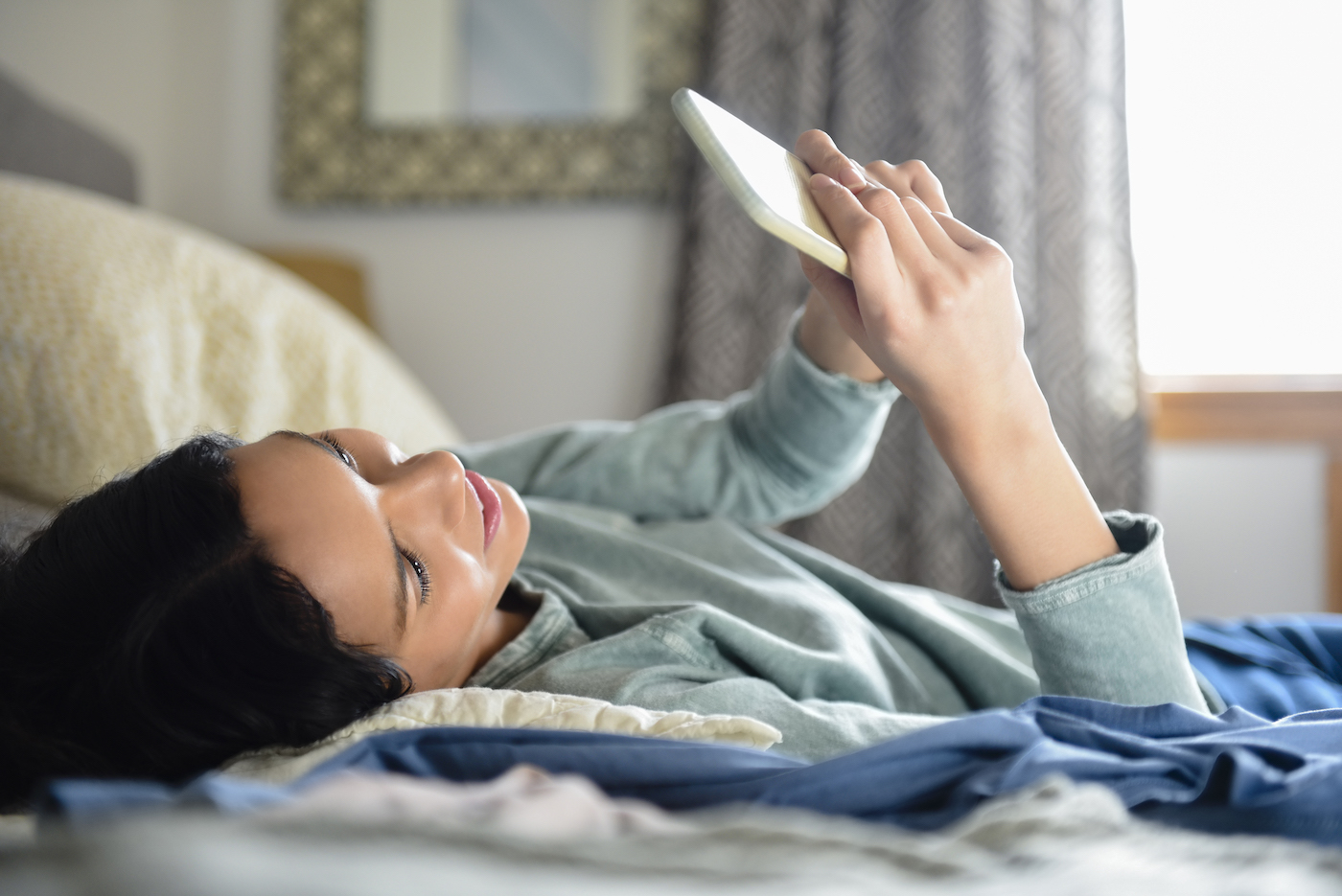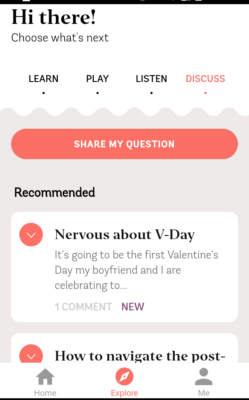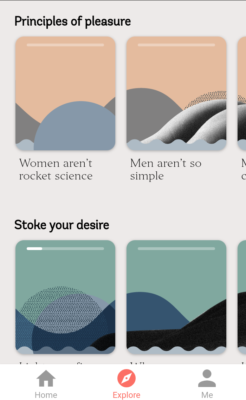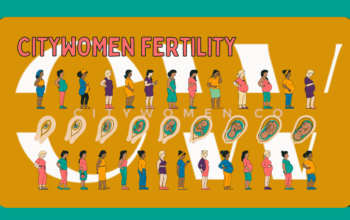
February 14, 2020 at 04:00PM by CWC
Eventually there comes a time when nobody wants to hear about your sex life anymore. I mean, I’m sure that’s not true for everybody (my experience in that realm is probably different than, say, J. Lo’s). But for many of us—especially those of us who once relied on our sexual misadventures to entertain friends at brunch—there’s a moment in time when the vibe changes. For me, that moment transpired when I met my husband. My friends loved hearing about my sex life when it involved random men they’d never meet. But when my stories started centering around someone stable, secure, healthy, and with long-term potential, no one wanted to hear the dirty details anymore.
While for the past decade, my husband and I have remained satisfied and happy with our nothing-new-to-see-here sexcapades, I am aware that we rarely task ourselves with seeking out new, unique sexual experiences. That’s where apps might come in. Early sex-focused apps focused wholly with the practical—like Clue, the period tracking app, and Spreadsheets, which literally counts the number of thrusts during your last sexual encounter—but more recently launched programs focus on a more holistic sexual experience. There’s the audio erotica app Dipsea; and sex-coaching app Juicebox; and Rosy, an app for women who have low desire; and Coral, an intimacy app that highlights education. All of these examples encourage users to get more in touch with themselves, learn more about their own sexuality, and feel in the driver’s seat of their own sex life, throughout life. So I wondered whether trying the Coral intimacy app, which launched in November 2019, might help shake up my sexual relationship with my husband.
Coral founder Isharna Walsh says her experience of being sexually active but not necessarily educated about how sexuality and desire work is what inspired her to create Coral, and that intention to connect thought process with physical action resonates with me. I, too, understand how to have sex, but getting into the psychological backing might help me discover a new frontier. “I get the happiest when we hear from a user who doesn’t otherwise get access to this kind of information, who isn’t in a sex positive environment,” says Walsh. “A huge motivator for us is that impact that we can drive in communities that might not have other sex positive resources.”

But though I’m into the admirable mission of the Coral intimacy app, I’m not sure whether it stands the power to help me: I’m not a product of sex-negative environment, and I do have access to reliable sexual information; I’m a sex writer who’s been sexually active since Friends was on the air, after all. So feeling open-minded but skeptical, I decided to try the Coral intimacy app to see whether it might just teach me something new.
Key features of the Coral intimacy app
I learned within my first moments of using the Coral intimacy app that I absolutely can stand to learn new information. The interface offers multipart courses on subjects like “The Science of Sexual Response,” “How To Have and Help Others Have Orgasms,” and “Beliefs You May Have Grown Up With.” Each course is developed with intel from members of Coral’s board of contributing experts—like sex counselor and psychotherapist Ian Kerner, PhD, author of female orgasm-centric sex guide She Comes First, and sex educator Emily Nagoski, PhD, author of Come As You Are: The Surprising New Science That Will Transform Your Sex Life.
Each course takes 20 minutes or less, with quick sections outlining the basics of the issue, interactive quizzes, and usually at least one personal audio story from someone who has a relevant experience to the focus of the respective course. There are also guided exercises for a number of personalized focuses, like examining your own genitals and learning to give a rim job.
The other, user-generated features of the Coral intimacy app are the discussion forum, where experts answers user questions, and Pulse, an in-app program that functions like a sex diary. With Pulse, users can write a brief entry or select from a word cloud to describe their current feelings about sex to provide insight into feelings and habits over time. The app comes in both free and paid versions; the free option provides some of the basic courses, as well as access to the discussion forum and the Pulse, while a $60 annual membership grants access to the full range of courses.
Did I learn anything new by using it?
The Coral program starts with an introductory course on the foundations of sex, including the difference between people who primarily experience spontaneous desire (when you become turned on rather suddenly by a person, image, or nothing) and responsive desire (when you need to deliberately touch or in order to get turned on). Somehow, despite my two decades of being sexually active and having experienced what I thought to be a thorough sex education, I had never heard of this duality in my entire life.
The lesson on spontaneous and responsive desire went beyond being informative; it actually answered some questions I had been navigating for a long time. When I was single, I didn’t spend enough time with any one person to dedicate significant thought to how I get turned on or how my sexuality worked with a partner. But in my marriage, I noticed that I often had to be touched before I got turned on—and that made me feel ashamed, as if my libido weren’t as vibrant as it once had been. Learning this was just a sexuality type, perhaps in a similar vein of the preference of wanting the lights on or off, rather than a personal failing, was revolutionary for me.
ADVERTISEMENT
ADVERTISEMENTSports Direct Free Delivery on All Orders! |
Somehow, despite my two decades of being sexually active and having experienced what I thought to be a thorough sex education, I had never heard of this duality in my entire life.
That said, my initial hesitations about Coral not offering new insights to me seemed to be the case for the most part. Though I could imagine its guides being amazing for someone just beginning to explore their sexuality, I’ve already looked at my vulva with a mirror and masturbated with a dildo; a mini-lesson on hand-job tips offered me nothing I hadn’t previously tried; and the Pulse feature didn’t offer me any particularly noticeable insights, either. I saw its potential to help a user suss out recurring issues or learn more about their desire, but I, for one, wasn’t totally sure what to write in it.
And yet, I can’t say Coral didn’t do anything for me. Aside from the lesson in desire types, I felt good about dedicating intention and effort to thinking and learning about sex. It helped me remember that sex is great, important to me, and not something I want to get lost in the shuffle as I attend to endless to-do list items.
Coral also helped me finally talk to my husband about my responsive sexuality. I had been too nervous to talk about it before, primarily because I wasn’t sure what was going on and didn’t have the language to describe how I felt. This knowledge helped me feel more confident, which made it easier to talk about it. Though I was never worried he wouldn’t hear me out or be kind, talking about sexuality can be really nerve-racking, even with someone you’ve been with for a decade, so it was nice to have a resource to back me up.
Ultimately, the Coral intimacy app may not have blown my mind with endless bits of new-to-me information, but it did lead me think about sex more, which had the net effect of making me want to have sex more—even if that sex wasn’t radically different from the sex I’d already been having. But the sex did help me feel connected to my husband and less ashamed of the desire journey I take to get there. Maybe that’s less sexy that rim job lessons, but I’d like to think it’s just as important, if not more, for the success of a healthy relationship.
For other sex intel, here’s why educators want you to have pillow talk after the main event. And you might want to bookmark this A-to-O glossary of sex terms.
Author Gabrielle Moss | Well and Good
Selected by CWC

ADVERTISEMENT
ADVERTISEMENTUp to 30% off Gift Sets |








